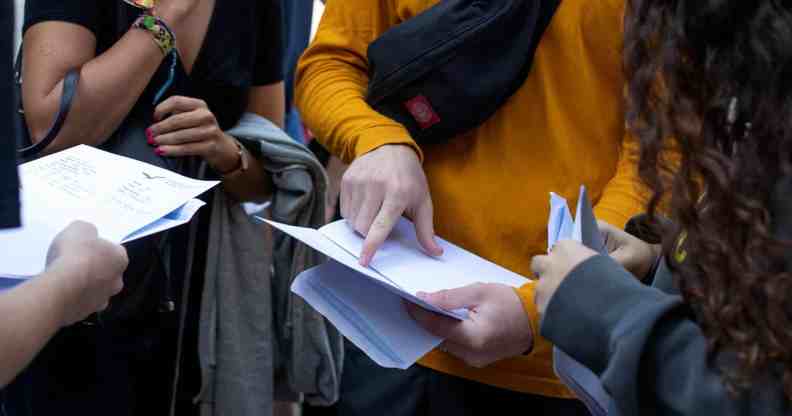Exam results of non-binary students to be recorded by qualifications council for very first time

The Joint Council for Qualifications “will be looking at” recording exam result data for non-binary pupils in the UK. (Getty/Dan Kitwood)
Exam results in the UK could be recorded for non-binary pupils for the first time, marking a huge step forward in inclusion for LGBTQ+ students.
The Joint Council for Qualifications (JCQ) – a membership organisation comprised of the eight largest providers of qualifications in the UK – currently breaks down exam results by binary gender categories. Information about students’ gender lets exam boards compare results between pupil groups and track tends over time like how many female pupils take maths subjects or the performance of male students on their qualifications.
However, a spokesman for the JCQ said in a statement to the Independent it was “looking at” adding in a new marker for non-binary youths in future breakdowns.
“The JCQ tables currently include breakdowns by male and female gender types,” the spokesman said.
“JCQ and its member awarding organisations do not collect the data required to include breakdowns for non-binary candidates. However, we will be looking at this in the future.”
The news comes ahead of this year’s GCSE results day on Thursday (25 August), which will be published by the JCQ.
The A-level results, published on 18 August, showed that female pupils accounted for 54.6 per cent of all entries for summer 2022, and grades were slightly higher for female entries than for male entries.
Pearson, an exam board which is part of the JCQ, said it consulted with Stonewall on how to be more inclusive of non-binary pupils taking their exams.

Data for exam results in the UK historically have been broken down by gender to compare how male and female students are performing. (Oli Scarff/AFP via Getty)
A spokesman for the exam board said it has “started the process” of updating its systems to collect data for non-binary students – meaning future exam result reports will be more representative of pupils with different gender identities.
“As a Stonewall Top 100 employer, Pearson works with Stonewall on a range of matters including how data might be collected for non-binary learners,” the Pearson spokesman said.
“We are pleased to share that we have started the process of updating our systems to enable this – and we commit to consulting with key stakeholders to demonstrate our continued support for the non-binary community.”
Stonewall welcomed the news with open arms in a statement to the Telegraph. A spokesperson for the LGBTQ+ charity said that using categories which include non-binary identities helps a “broader spectrum of people feel recognised and respected”.
“It is great to see JCQ looking at ways to be more inclusive of pupils taking exams,” they added.
Stonewall said it was important to use exam result data to “understand underperformance and related issues in girls and boys”, and it is also crucial to chart the performance of non-binary pupils in the UK education system.
“It is important to reflect that non-binary people make up less than 1 per cent of the population, and their inclusion is highly unlikely to skew data in any meaningful way,” the spokesperson added.

